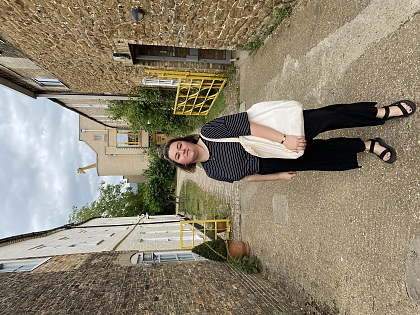Sarah
Agile learning, research and critical thinking, and social responsibility
Tell us a bit about yourself.
My name is Sarah and I live in Cambridge. I studied BSc International Business, Finance & Economics and then MSc Environment, Climate Change & Development, finishing in 2021. I now work as a Development Officer for a non-governmental organisation (NGO) supporting girls to go to and stay in school, operating in five countries in Africa.
How are agile learning, research and critical thinking, and social responsibility important in your current role?
My job involves a lot of report writing, often to a very tight deadline and a strict brief. It takes a great deal of research to bring together the information before I can even begin writing reports. I look at source documents from our colleagues in the field, financial reports and budgets, and collate data from organisations such as the United Nations, the World Bank, and Oxfam. I use my agile learning skills to bring together this research to create a fuller picture when writing reports. I have to synthesise a lot of information and ensure that it’s easily understood by others, so it takes a great deal of research and critical thinking skill to discern what is relevant to the story I’m trying to tell, and what isn't.
Social responsibility really guides everything I do. I wanted to work in the third sector because I wanted a socially responsible career. It also guides my day-to-day work in the way that we frame our clients - the girls we support to go to and stay in school - as active participants in their own communities. Additionally, it shapes some of the larger decisions we have to make, such as what we can do with funding. I am really glad I have a job which so closely aligns to my values.
How did you develop each of these skills during your degree?
The interdisciplinary nature of both of my degrees really helped me to develop my agile learning abilities. During my undergraduate degree, we had a huge range of modules to choose from, which meant my learning was really wide-ranging. Covering everything from statistics to finance to politics, I had to become an agile learner in order to perform well.
As for research skills, for my MSc dissertation especially, I was pulling together literature on disparate and wide-ranging topics while trying to explain how they related to each other. We received fantastic teaching in a range of research methods, which helped me to discern what would be the most helpful for my own aims with my dissertation. Doing a long research project independently meant that I really honed those skills throughout my dissertation.
I felt like social responsibility was a huge part of my experience at Manchester from day one, starting with the Ethical Grand Challenge. I was really interested in volunteering, and ended up facilitating peer-led CBT groups at the University Counselling Service. From there, I realised I really wanted a job where I felt as though I was doing something worthwhile, so I applied for a Student Experience Internship at a local charity in Manchester in between my second and third year. I loved the internship, and my experience over that summer cemented that I wanted a career in the third sector.
How did these skills help you get your first graduate job?
Through my degrees, the internship opportunity, and volunteering roles that I had carried out, I ticked all the boxes in the person specification for my job. I could prove I had the technical skills needed through my experience - research skills, agile learning, project management, and writing skills. I also needed to show that I had a passion for the organisation’s mission and that their values really aligned with my own, which I could definitely do through describing my volunteering and internship experiences.
What were the main factors that influenced your choice of first graduate job?
I was very open-minded when I began to search for my first graduate job, but I knew I wanted to move away from Manchester, try something new, and expand on my experience in the third sector. I narrowed down my applications to jobs where I felt I would enjoy the role and I admired the work of the organisation, because I knew this is what would keep me motivated and engaged at work. I also knew I would prefer to work in an organisation with a collaborative and supportive culture. As a recent graduate, it was really important that I could ask as many questions as I needed and be given the space to learn and grow. Flexible working and the ability to work remotely was also something I hoped for, but was willing to compromise on for the right job. I am really lucky that my current job has exactly what I was looking for.

